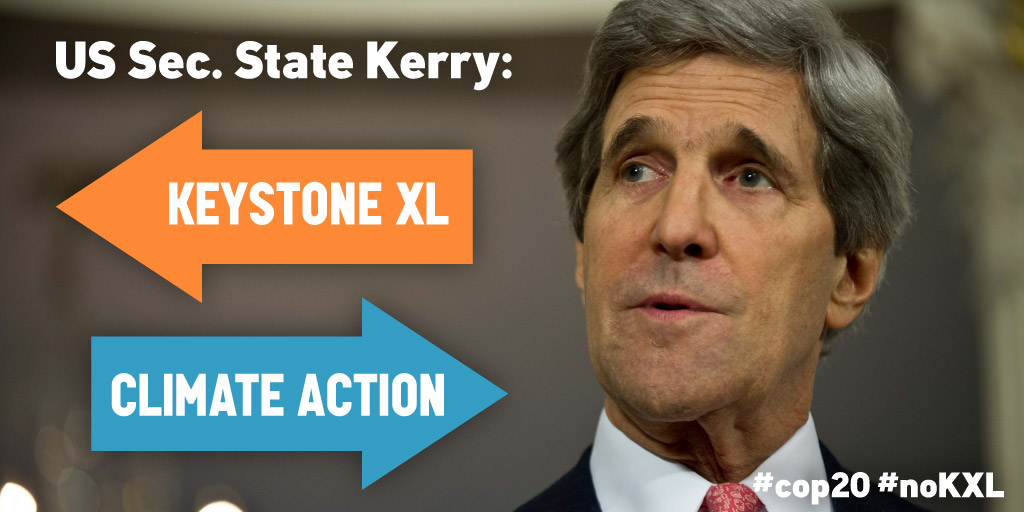Lima, Peru — As delegates from nearly 200 countries and indigenous tribal nations gather in Lima this week to develop a framework for a historic international deal to combat catastrophic climate change, President Obama and Secretary Kerry have an opportunity to cement the role of the United States as a global leader on climate issues. The key step? Rejecting the Keystone XL tar sands pipeline.
“We have seen positive steps taken by the U.S. in recent weeks, and that should be applauded,” said Nauru Ambassador Marlene Moses, who chairs the Association of Small Island States. “Now is not the time to call the superpower’s commitment to tackling this crisis into question by letting this dirty, myopic, and irresponsible project go forward.”
Activists will be pressuring Secretary Kerry on the pipeline as he arrives in Lima on Thursday. At 11:00am Lima time this Thursday, climate groups are hosting a #NoKXL “twitter storm” to flood the #COP20 hashtag with tweets urging rejection. At 3:30pm, activists will host a demonstration against the tar sands inside the COP20 conference center.

“Citizens around the world are calling out for leadership in the global effort to fight climate change as we move towards Paris, and the recent actions taken by the Obama administration suggest they may be listening. Approving the Keystone XL pipeline would swing a huge hammer to the delicate credibility the U.S. has built in recent months,” said David Turnbull, Campaigns Director of Oil Change International.
“Keystone XL is a climate disaster and completely inconsistent with the U.S. commitments being put forward at these talks,” said 350.org Communications Director Jamie Henn, who is at the talks in Lima. “The U.S. can join the world in pushing for progress or be sidelined as a climate laggard like Canada and Australia. Approving Keystone XL would undermine U.S. credibility in this process.”
“The Obama Administration has made incredible progress of late; but approving the Keystone XL tar sands pipeline cuts against the President’s commitment to fight climate change and ability to bring the rest of the world along to safeguard our future,” said Jake Schmidt, International Program Director, Natural Resources Defense Council.
The controversial proposed pipeline project would be a disaster for the climate by supporting the massive expansion of Canada’s dirty tar sands, which the Canadian government has made clear they have no plans to regulate. It has become a test of the Obama Administration’s commitment to fighting climate change, both at home and abroad. Former EU Commissioner for Climate Action Connie Hedegaardhas said that rejecting Keystone “would be an extremely strong signal for the Obama administration.”
Many credit the success of this round of climate talks compared to past summits to the willingness the United States has shown to make meaningful progress on climate, through the Obama Administration’s proposed power plant regulations and the climate accord recently reached between the U.S. and China.
When world leaders gather again next year in Paris to finalize a global climate deal, having rejected Keystone XL would send a strong signal that the United States is prepared to take initiative to keep fossil fuels in the ground to avert climate disaster–and it would be a model for other world leaders to similarly steer their countries away from dirty fuels toward cleaner ones.
Approving the pipeline or allowing the process to continue to drag on would undermine the Obama Administration’s credibility going into these crucial talks, and could threaten to negate the important progress being made on the global stage to leave a livable planet for future generations.
###